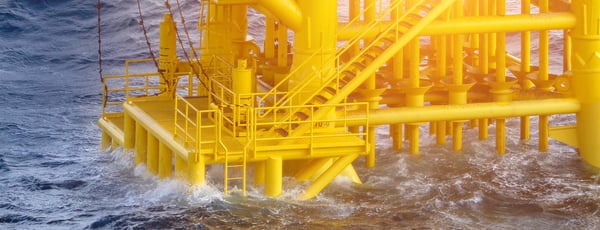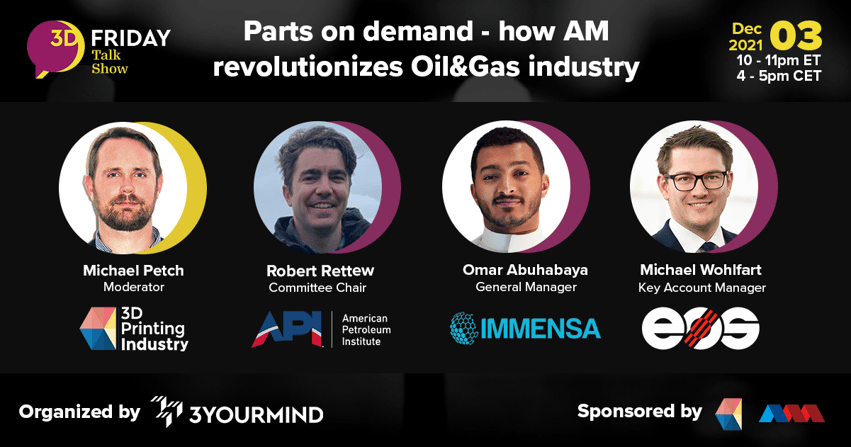Oil & Gas Accelerates Its Use of Additive Manufacturing
Find out why oil and gas companies are leaning into additive manufacturing.
The recent partnership between two leaders in their respective industries further indicates how valuable additive manufacturing will be to the future of industrialization. DNV GL, one of the major voices within the oil and gas industry, invites 3YOURMIND to participate in the Digital Warehouse Joint-Innovation Project.
Focused on standardizing spare part production and improving the energy value chain, this partnership will equip both sides with the resources and data to transform the oil & gas industry. Led by DNV GL, the Digital Warehouse Joint-Innovation Project includes industry leaders from around the world dedicated to standardizing a quality assurance process focused on 3D printing. 3YOURMIND joins a prestigious list of partners and will be called upon to implement their software and data collection expertise.
Historical Context: How Has Additive Manufacturing Impacted Oil & Gas?
Many oil & gas companies were hesitant to adopt additive manufacturing due to the lack of standardized materials and processes. And for good reason, since most of the potential 3D printed parts are critical components that must withstand extreme conditions. However, advancements in material properties and the string of successes amongst other notoriously strict industries, such as aerospace, automotive, and medical, have justified 3D printing as a viable manufacturing method. According to consulting firm Global Data, 3D printing in the oil & gas market is expected to be worth $32 billion by 2025. Much of this anticipated growth is focused on supply chain resiliency, MRO applications and on demand manufacturing.
In January 2019, multinational oil and gas company BP, identified additive manufacturing as one of the transformational technologies that will impact this industry (along with artificial intelligence, robotics, and others). With a significant interest to simplify the supply chain and create complex, efficient components for offshore platforms, BP is poised to further investigate the benefits associated with 3D printing and pave the way for adoption.
Total, a French oil & gas company, shared their recent success with additive manufacturing and highlights design freedom as a major advantage. Total was able to limit drilling rig downtime by 3D printing repair parts locally and bypassing expensive logistics and shipping costs. It’s also worth mentioning that local production and less raw material waste benefits their carbon footprint reduction goals.
GE Oil & Gas has made it very clear that additive manufacturing is a key component to the future of its business. From prototyping to production, AM is enabling engineers to design and build lighter-weight replacement parts that do not sacrifice required strength or quality. GE recognizes that in order for AM to continue its adoption trajectory, the collective industry must maintain quality control standards.
The DNV GL Digital Warehouse Joint-Innovation Project
 Source: DNV GL
Source: DNV GL
In 2017, DNV GL published its first class guideline for AM in the maritime and oil & gas industries. This 48-page document extensively covers the economic benefits of digitization, spare part replacement and how valuable data is to optimize production. Fast forward three years later and DNV GL is at the forefront of the industry again with the Digital Warehouse Joint-Innovation Project (JIP). This project invites leaders from across the globe to participate in and develop a quality assurance process that mitigates risks and amplifies the benefits of additive manufacturing. The Joint-Innovation Project, which kicked off in May 2020, addresses the following:
3YOURMIND, recently invited to participate in the Digital Warehouse JIP, has been tasked with aggregating and analyzing the data required to solve the questions relating to provider, part, and process qualification. 3YOURMIND has successfully built relationships with major organizations in the aerospace, defense, and transportation industries, so its participation makes complete sense.
“We are grateful to have 3YOURMIND on-board in this a joint industry project. The work they have already done in other industries will prove valuable when working towards an agile spare part inventory management in the oil & gas industry. The business case for moving spare parts to the digital space is definitely there, but will only be reality if we are able to create an efficient and reliable supply chain, and focus on the parts that make sense. We see this assurance framework as a crucial step to make this happen, and 3YOURMIND’s expertise is important in its development.”
Ole-Bjørn Ellingsen Moe, Materials Engineer at DNV GL.
“Similar to other strict regulatory industries, data is the lifeblood of efficient production and we are excited to offer our suite of agile software solutions to increase transparency,”
Aleksander Cizsek, 3YOURMIND Founder and CEO.
Quality assurance relies on identifying and mitigating risks and as the AM industry expands, so will the need for tools that can qualify parts and ensure repeatability. This is the bedrock principle of the digital warehouse.
Enabling Spare Parts On Demand
The costs associated with spare parts in the oil & gas industry have quickly become a major concern. Downtime for an offshore oil rig can be incredibly expensive, and companies can no longer live with the logistical problems that come with long lead times, outdated transportation methods, and the warehousing of spare parts that may never be used. For example, a major oil & gas operator reported over 3 billion £ worth of spare parts in physical warehouses, and the recurring costs related to maintenance is just too high. All of this to say, the industry requires a new way of doing business.
Additive manufacturing has proven to be a viable option when it comes to the production of strategic replacement parts such as gas turbine nozzles, pump manifolds, rotors, sealing accessories, and more. As the technology improves, so does the qualification process.
The objective of the DNV GL Digital Warehouse JIP is to develop a QA framework to ensure that the end-users receive the right part, with the right properties, at the right time.
- How to define and ensure part readiness for spare part replacement? What data is necessary to qualify providers, parts, and processes?
- What if the spare parts can be stored digitally and manufactured on demand? How would the reduction in warehousing and wasteful production benefit the bottom line?
- What are the potential risks associated, and what procedures need to be implemented to mitigate such risks?
Looking Ahead
According to a recent report from Business Insider, the number of oil rigs located across the globe has decreased 30% to approximately 1,500 locations. This is a significant drop from the previous number reported in April 2019 at approximately 2,100. With transportation halted across the globe due to COVID-19, many operators and supermajors within the oil & gas industry are looking for ways to cut costs and improve efficiencies. Additive manufacturing began as an R&D project for many and is quickly transitioning to a strategic and imperative new business model.
The DNV GL Digital Warehouse Joint-Innovation Project is well underway and will continue to focus on risk assessment. Remote workshops are currently taking place to align expectations, identify failure modes, and define the scope and its boundaries. 3YOURMIND is a welcomed partner to the JIP and will bring significant insights and expertise to one of the most progressive and forward-thinking programs affiliated with oil & gas.
 Source: DNV GL
Source: DNV GL
To learn more about AM in the Oil & Gas Industry - watch our episode of the 3D FRIDAY TALK SHOW "Parts on demand - how additive manufacturing revolutionizes oil&gas industry".

